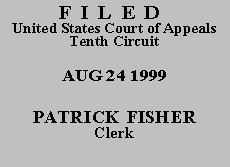

| DANIEL K. JAMES,
Plaintiff-Appellant, v. KENNETH ROSS GRIECHEN, in his individual capacity, Defendant-Appellee. |
|
Plaintiff Daniel K. James appeals from the district court's verdict in favor of defendant Kenneth Ross Griechen on James's 42 U.S.C. § 1983 civil rights complaint alleging violation of his Fourth and Fourteenth Amendment rights. Officer Griechen obtained a warrant for James's arrest on a larceny charge after James failed to return a tile saw to a subcontractor who owed him a debt. Griechen arrested James and held him overnight in jail. The district attorney declined to prosecute James. After James was released, he brought this action asserting § 1983 and state law claims against Officer Griechen.(1) We affirm.
James's § 1983 claim appears to be based on theories of wrongful arrest and malicious prosecution. Lack of probable cause is an essential element of each claim. See Taylor v. Meacham, 82 F.3d 1556, 1562 (10th Cir. 1996) ("[A]n arrest warrant must be supported by probable cause to comply with the Fourth Amendment."); Wolford v. Lasater, 78 F.3d 484, 489 (10th Cir. 1996) (stating lack of probable cause is an essential element of the tort of malicious prosecution in New Mexico). Here, the district court held a bench trial and entered a verdict in favor of Officer Griechen, finding that Griechen's affidavit in support of the arrest warrant was sufficient to support a finding of probable cause. The court further found that, given probable cause for the arrest and the lack of proof of procedural improprieties, James's state law claims for false arrest, illegal imprisonment and malicious prosecution must also fail.
James now argues that there was no showing that he had specific intent to permanently deprive the owner of the tile saw at the time he took it. Therefore, he argues, there was not probable cause to arrest him for the crime of larceny as that crime is defined under New Mexico law, and no arrest warrant should have been issued. He further asserts that Officer Griechen should have freed him rather than incarcerating him overnight. He argues that although Griechen was unable to contact the magistrate who approved the warrant and set the bail amount, Griechen knew that the magistrate planned to release James on his own recognizance and should therefore have released James rather than jailing him.
Following a bench trial, we review the district court's findings of fact for clear error and its conclusions of law de novo. See EEOC v. WilTel, Inc., 81 F.3d 1508, 1513 (10th Cir. 1996). Having reviewed the parties' briefs and contentions, the district court's order, and the record on appeal pursuant to these standards, this court finds no reversible error. The judgment of the United States District Court for the District of New Mexico is therefore AFFIRMED for substantially the same reasons set forth in its findings of fact and conclusions of law dated August 14, 1998.
Entered for the Court
Circuit Judge
*. This order and judgment is not binding precedent, except under the doctrines of law of the case, res judicata, and collateral estoppel. The court generally disfavors the citation of orders and judgments; nevertheless, an order and judgment may be cited under the terms and conditions of 10th Cir. R. 36.3.
1. James initially named the City and County of Los Alamos, New Mexico as a defendant; however, he dropped Los Alamos as a defendant in his first amended complaint.